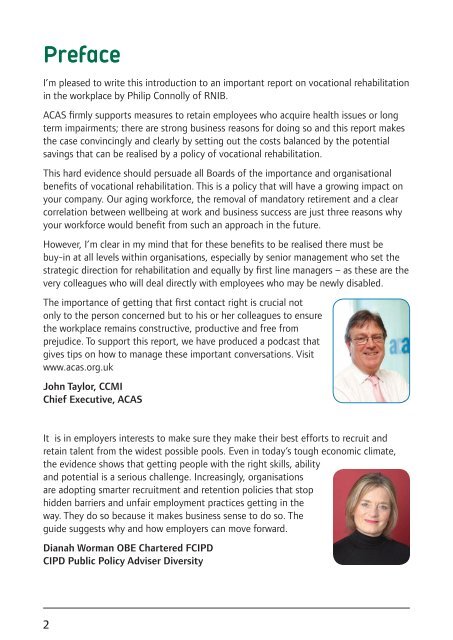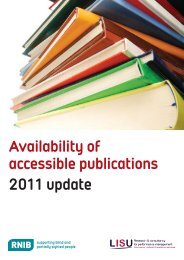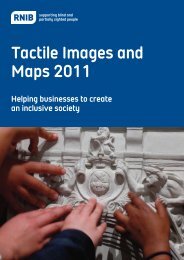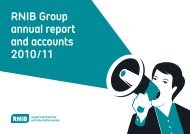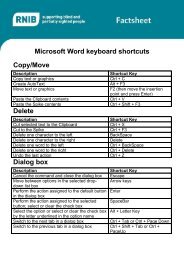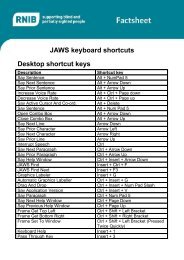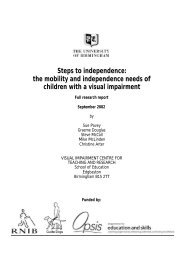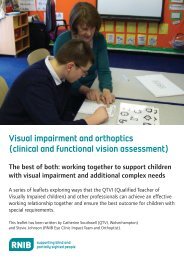Vocational rehabilitation: The business case for retaining ... - RNIB
Vocational rehabilitation: The business case for retaining ... - RNIB
Vocational rehabilitation: The business case for retaining ... - RNIB
Create successful ePaper yourself
Turn your PDF publications into a flip-book with our unique Google optimized e-Paper software.
Preface<br />
I’m pleased to write this introduction to an important report on vocational <strong>rehabilitation</strong><br />
in the workplace by Philip Connolly of <strong>RNIB</strong>.<br />
ACAS firmly supports measures to retain employees who acquire health issues or long<br />
term impairments; there are strong <strong>business</strong> reasons <strong>for</strong> doing so and this report makes<br />
the <strong>case</strong> convincingly and clearly by setting out the costs balanced by the potential<br />
savings that can be realised by a policy of vocational <strong>rehabilitation</strong>.<br />
This hard evidence should persuade all Boards of the importance and organisational<br />
benefits of vocational <strong>rehabilitation</strong>. This is a policy that will have a growing impact on<br />
your company. Our aging work<strong>for</strong>ce, the removal of mandatory retirement and a clear<br />
correlation between wellbeing at work and <strong>business</strong> success are just three reasons why<br />
your work<strong>for</strong>ce would benefit from such an approach in the future.<br />
However, I’m clear in my mind that <strong>for</strong> these benefits to be realised there must be<br />
buy-in at all levels within organisations, especially by senior management who set the<br />
strategic direction <strong>for</strong> <strong>rehabilitation</strong> and equally by first line managers – as these are the<br />
very colleagues who will deal directly with employees who may be newly disabled.<br />
<strong>The</strong> importance of getting that first contact right is crucial not<br />
only to the person concerned but to his or her colleagues to ensure<br />
the workplace remains constructive, productive and free from<br />
prejudice. To support this report, we have produced a podcast that<br />
gives tips on how to manage these important conversations. Visit<br />
www.acas.org.uk<br />
John Taylor, CCMI<br />
Chief Executive, ACAS<br />
It is in employers interests to make sure they make their best ef<strong>for</strong>ts to recruit and<br />
retain talent from the widest possible pools. Even in today’s tough economic climate,<br />
the evidence shows that getting people with the right skills, ability<br />
and potential is a serious challenge. Increasingly, organisations<br />
are adopting smarter recruitment and retention policies that stop<br />
hidden barriers and unfair employment practices getting in the<br />
way. <strong>The</strong>y do so because it makes <strong>business</strong> sense to do so. <strong>The</strong><br />
guide suggests why and how employers can move <strong>for</strong>ward.<br />
Dianah Worman OBE Chartered FCIPD<br />
CIPD Public Policy Adviser Diversity<br />
2


